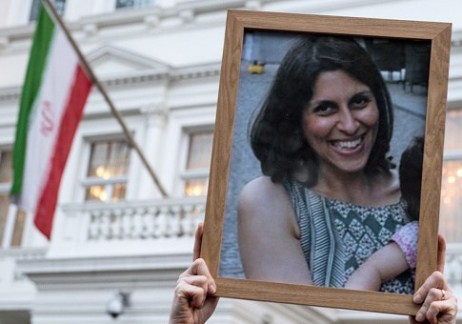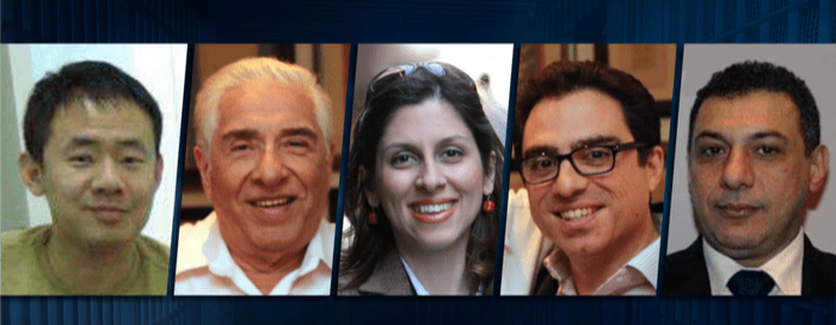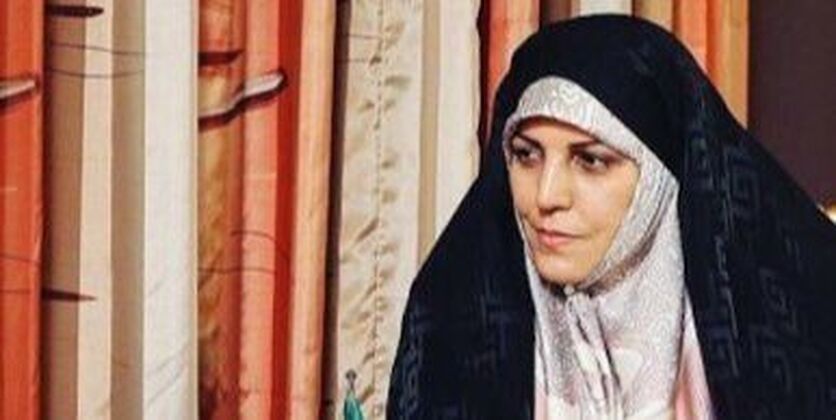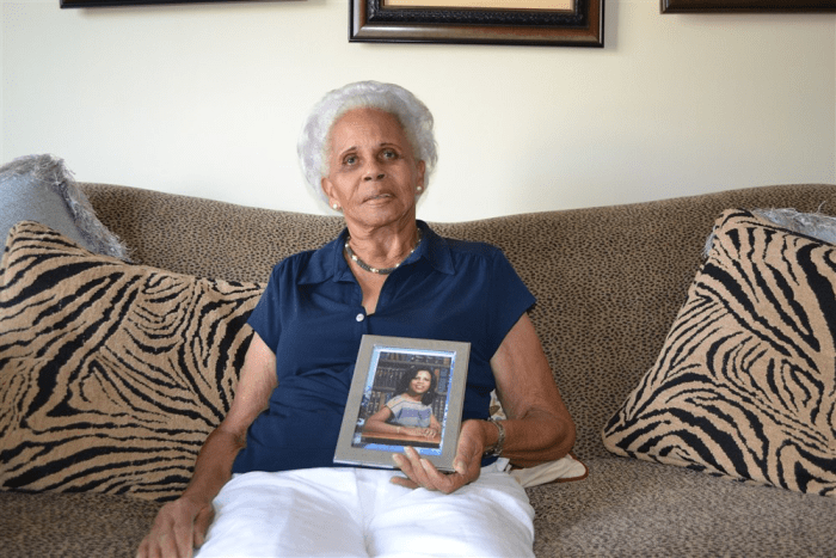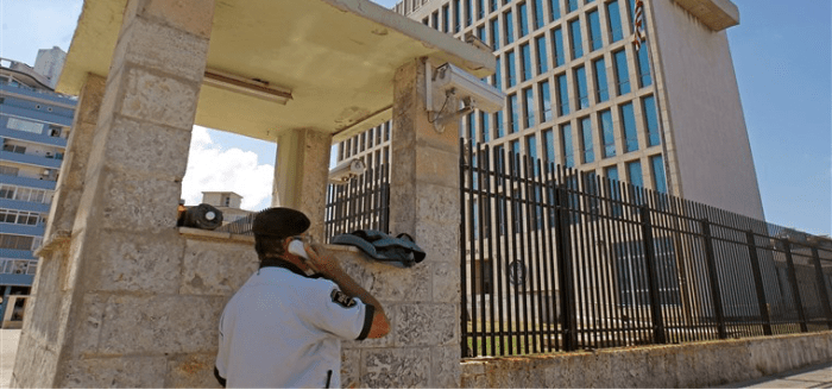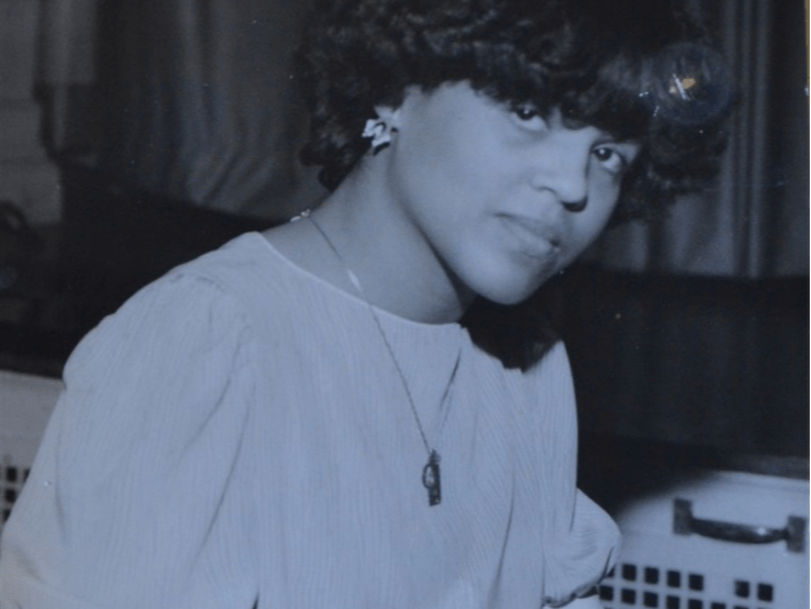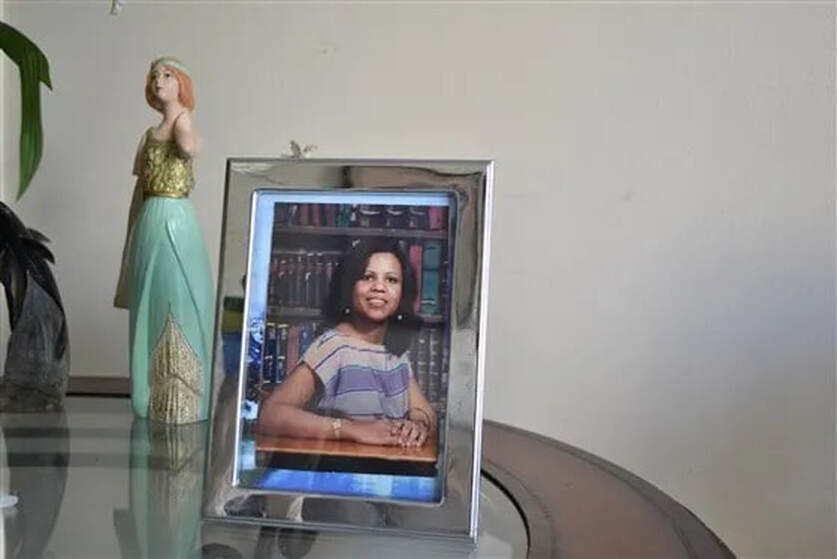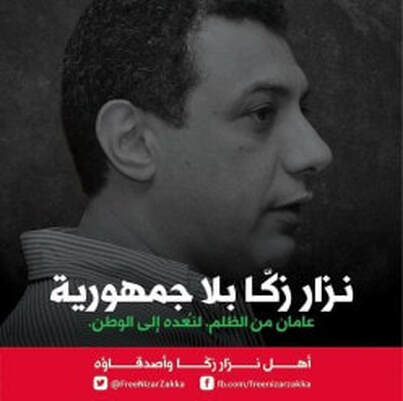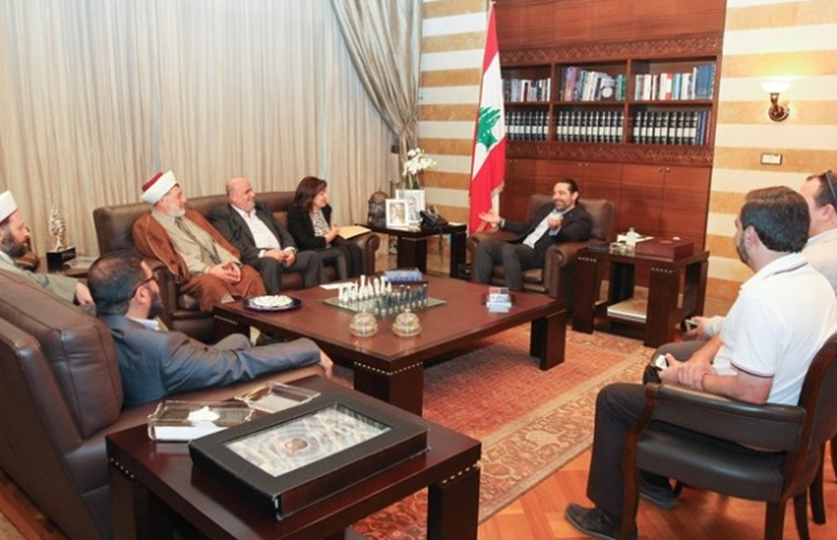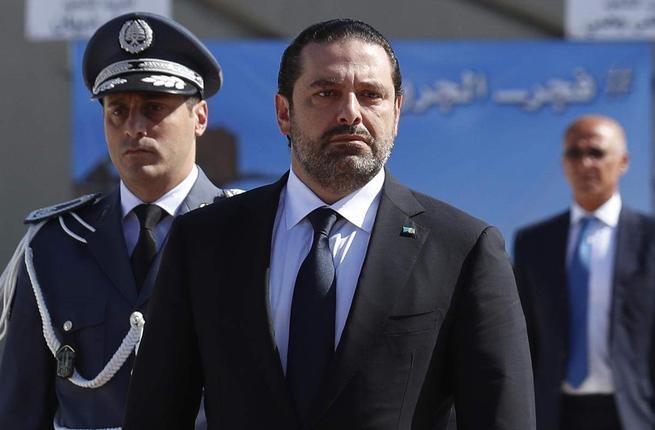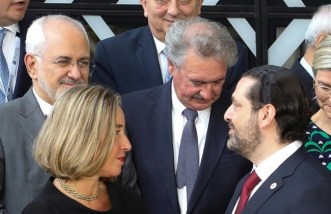|
The following article was published in The Washington Free Beacon on October 2. The original publication can be found here. The families of American citizens and dual nationals with strong Western ties held for years in Iran joined forces and met for the first time last week on the sidelines of the United Nations General Assembly meeting to press international diplomats for their release.
The family members agreed to team up and press the Trump administration and key European officials to help amplify and coordinate their message. The action came after trying to work individually and complying with their governments’ advice not to work together in the hope that private efforts to lobby the Iranian government would pay off with the release of their loved ones. Among the family members at the meeting was Sarah Moriarty, daughter of Robert Levinson, the longest-held hostage in U.S. history, assuming he is alive, and a former Drug Enforcement Administration and FBI agent who disappeared in 2007 in Kish Island, Iran. During the gathering with family members in New York last week, Moriarity grew emotional, lamenting that there are no recent clues or news angles to sell to the media to raise more awareness about her father’s disappearance but committing to continuing trying to seek his release and work with other families on a coordinated strategy. “We’ve been through three American administrations … he’s 70 years old and he’s had no contact with anyone, no one from our family for the last 11 years, not anyone that he loves—no human touch,” she said. “These are violations of the most basic human rights … he has missed three weddings including my own and the birth of five grandchildren, including two of my own.” “There needs to be more accountability and repercussions for the government of Iran,” she said. “If he is still alive … we need to move. Every day that we lose is another day that he is getting older. We don’t know how much longer we have.” Moriarty added that “we do not want to face an Otto Warmbier situation.” Warmbier, a University of Virginia student who was arrested while visiting North Korea as a tourist in 2016 for trying to steal a propaganda poster from his hotel, was detained in North Korea for a year and a half and died last June just days after he returned home in a coma. Moriarty and her brother, David Levinson, along with other family members of those detained in Iran, met with several U.S. officials during the United Nations General Assembly meeting. Secretary of State Mike Pompeo and National Security adviser John Bolton, while at the U.N. summit, both repeated U.S. calls for Iran to locate Robert Levinson and enable him to return to the United States. Richard Ratcliffe, the husband of Nazanin Zaghari-Ratcliffe, a British-Iranian charity worker for Thomson Reuters Foundation, also participated in the meeting with family members as a way to utilize every strategy and combine efforts to try to secure the safe return of his wife, who has been held in Iran for two and a half years. “We don’t normally say Nazanin is a hostage, [though] I do talk about her being a bargaining chip,” Ratcliffe wrote in an article posted by the Foundation on Thursday. “She hasn’t done anything . And actually … [she is a] state-held hostage. The U.K. needs to do something.” Many other family members of Western-linked foreigners or Iranian dual nationals have long accused Tehran of trying to use their loved one’s imprisonment as a way to extract monetary concessions from the U.S. government or their families or as a bargaining chip in disputes with the U.S. Human Rights Watch on Wednesday said it had documented the cases of 14 Iranian dual or foreign national that Iran’s Islamic Revolutionary Guard Corps has arrested since 2014. Amnesty International puts the number at 15, including Iranian-Americans Siamak Namazi and his father Baquer Namazi, Chinese-American Xiyue Wang, and Nizar Zakka, a Lebanese national and permanent U.S. resident. Nadim Zakka, his son, recalled how an Iranian official, a member of Iranian President Rouhani’s cabinet, had invited Zakka, an internet freedom advocate, to attend a conference in Iran in the fall of 2016. After participating in the conference and taking photos with several Iranian officials, members of the IRGC “kidnapped” him on his way to the airport, his son recalled. Zakka said his father has begun his sixth hunger strike and is enduring life in an underground, rat- and cockroach-infested cell, where he does not see sunlight, with 50 other people. “His captor may want to take his dignity but as long as he has his mind and body, he will fight,” Nadim Zakka said during the meeting with the other families. Wang’s wife, Hua Qu, said she her husband, a Princeton University graduate student, had approval from the Iranian government to visit and study in the country. That did not prevent him from being arrested and thrown in Iran’s notorious Evin prison, she said. Hua Qu recalled how her son just started kindergarten this month and drew a picture of their family, which included his father—something that has not occurred over the past year. She said the picture showed them in snow and snowsuits and recalled how the last day the three were together in January 2016 it was a snowy day. “A lot of times I think my son doesn’t remember his dad, but [in the picture] he is wearing the same snow suit as his dad. That actually gives me strength, and I will keep up the effort until my husband comes home.” “This is the first time I’ve come to UNGA,” she said. “The families have never been united—this is the first time. I do this for my husband and my young son.” “People asked me to keep silent a whole year and every single month, I hoped I would see some news … and they would quietly release him, but it didn’t happen,” she said. Ali Rezaian, the brother of Washington Post reporter Jason Rezaian, was also on hand last week to share his story with the families of other prisoners held in Iran. Jason was jailed and released in January 2017 as part of a prisoner swap with Iran and the payment of $1.7 billion to Tehran by the U.S. government to settle an old dispute. Rezaian said the families’ decision to come together is a great unifying step that will help them gain power in numbers. He also argued that the family members continue to push their governments to recognize their condition and speak openly about their imprisonment in Iran. “A lot of times there’s hope that Iran will come to their senses, and that never happens. And it’s incumbent on families and other government involved to take as much information into consideration as possible and take a clear position and work through it,” he said. This article was published by VOA News. The original publication can be found here Composite image of five Western-linked detainees held by Iran. From left to right: Xiyue Wang, Baquer Namazi, Nazanin Zaghari-Ratcliffe, Siamak Namazi and Nizar Zakka.Iran’s practice of detaining foreigners and Iranians with Western ties for alleged security offenses has prompted their families to join forces for the first time to lobby international diplomats for their release. In the first gathering of its kind, family members of the detainees collectively met with officials of the United States and other nations Wednesday on the sidelines of the U.N. General Assembly in New York, urging them to press Iran to free their loved ones. Levinson family One of those who joined the campaign is Daniel Levinson, a son of American Bob Levinson, who went missing in Iran 11 years ago. Family members believe Tehran is holding the elder Levinson, but Iranian officials have denied knowledge of his whereabouts. “By working with these other families, the goal is to make sure that the world is not forgetting that Iran has taken a number of American hostages,” Daniel Levinson told VOA Persian Thursday via Skype from New York. “We have to band together, make sure our message gets out and continue to work with whoever in the U.S. government and international governments can help us.” Support Global Liberty Alliance efforts to help secure the release of Americans and others held hostage by Iran and other nations! Levinson said he met with several U.S. officials this week in New York. “It seems like they are pressing our case to get (my) dad home,” he said. “We also have several (other) governments who hopefully will be talking to the Iranian government during their (UNGA) meetings.” In remarks this week to a New York forum of U.S. advocacy group United Against a Nuclear Iran, U.S. Secretary of State Mike Pompeo and National Security Adviser John Bolton both repeated U.S. calls for Iran to locate Bob Levinson and enable him to return home. “We are encouraged that the Trump administration is taking the right steps to keep the pressure on Iran and make sure that they are not going to get away with my dad being taken (captive) for this long,” the younger Levinson said. British-Iranian charity worker
Another family member of a detained Westerner who joined this week’s lobbying efforts in New York was Richard Ratcliffe, husband of Nazanin Zaghari-Ratcliffe — a British-Iranian charity worker for the Thomson Reuters Foundation held in Iran for 2½ years. “We don’t normally say Nazanin is a hostage, (although) I do talk about her being a bargaining chip,” Ratcliffe said in an article posted by the Foundation on Thursday. “She hasn’t done anything (wrong). And actually … (she is a) state-held hostage. The U.K. needs to do something. The U.N. needs to do something.” Family members of Western-linked foreigners and Iranians detained by Tehran long have accused it of using their loved ones as bargaining chips in Iranian disputes with Western powers. Iran has said little about the detainees beyond the alleged security offenses that they have been charged with. Relatives and other supporters of the detainees say those detainees are innocent. In a report published Wednesday, the U.S.-based rights advocacy group Human Rights Watch said it has documented the cases of 14 Iranian dual or foreign nationals whom Iran’s Islamic Revolutionary Guard Corps has arrested since 2014. HRW said Iran’s security apparatus has escalated its targeting of such dual citizens and foreign nationals whom Tehran perceives to have undesirable links with Western academic, economic, and cultural institutions. Those detainees include Iranian-Americans Siamak Namazi and his father Baquer Namazi, Chinese-American Xiyue Wang, and Lebanese U.S. permanent resident Nizar Zakka. WASHINGTON FREE BEACON: IRANIAN OFFICIAL SLAMS REGIME OVER MISTREATMENT OF IMPRISONED AMERICAN9/20/2018
The following article was published by The Washington Free Beacon on September 20, 2018. The original publication can be read here. IRANIAN OFFICIAL SLAMS REGIME OVER MISTREATMENT OF IMPRISONED AMERICANA senior Iranian official’s pointed public criticism of the regime’s mistreatment of a U.S. permanent resident imprisoned in Iran for three years is offering a glimmer of hope for his family and advocates of all western prisoners held in Iran after years of despair and stalled negotiations.
Shahindokht Molaverdi, an outspoken senior adviser on human rights to Iranian President Rouhani, late last week for the first time said the Iranian government had “failed” to help Nizar Zakka, a Lebanese-born internet-freedom advocate who she had invited to a government-sponsored summit. After participating in the summit and posing for photos with Molaverdi and several other Iranian officials, Zakka was captured on his way to the airport to fly back to the United States by the Islamic Revolutionary Guard Corps on Sept. 18, 2015, and jailed, according to his attorney and Molaverdi. He was later charged with spying for the U.S. government and sentenced to 10 years in Iran’s notorious Evin prison. “This is in no way approved by the government,” Molaverdi told the Associated Press in a wide-ranging interview published on Friday. “We did all we could to stop this from happening, but we are seeing that we have failed to make a significant impact.” Zakka, who has lived in the United States for decades, is one of 15 publicly known prisoners with strong western ties unjustly imprisoned in Iran, according to Amnesty International. The Washington Free Beacon first reported that Molaverdi had invited Zakka to the government-sponsored summit and the exact timing and details of his imprisonment in September 2015. Zakka was arrested and imprisoned a day after delivering a presentation on information communication technology for “women empowerment” at the conference, a presentation designed to help women become more active within their communities. Molaverdi has requested the presentation and approved it, according to Zakka’s attorney, Jason Poblete. Zakka has gone on six hunger strikes and last year issued a desperate plea for his release in an audio recording, asserting his innocence on the spying charges. Poblete said Zakka’s health is in sharp decline and he continues to refuse to sign a confession to the spying charges despite repeated demands by his prison guards to do so. The willingness of an Iranian official to publicly challenge the government’s actions surprised some U.S. human rights activists who said such internal public dissension on the treatment of an American prisoner is virtually unprecedented. The comments spurred a new round of speculation—and a degree of hope for families and advocates of western prisoners held in Iran—that Iran’s economic turmoil and ongoing nationwide protests over the regime’s brutal and oppressive policies is starting to give moderates more leverage against the regime hardliners. “It’s a huge risk to criticize the judiciary like that—I have to admire her for doing it. It’s encouraging,” Elise Auerbach, an Iran country specialist for Amnesty International USA, told the Washington Free Beacon. “Rouhani himself, left to his own devices, I think would not choose to be imprisoning all these prisoners of conscience … but he doesn’t have any real control on what the security agencies do.” Molaverdi has a history of speaking out on controversial subjects, including women’s rights. She has condemned police actions against women loosely wearing their mandatory headscarves and has pushed for access for women to sporting events. Poblete, Zakka’s U.S.-based attorney, called Molaverdi’s remarks a “welcome sign” and an acknowledgement that his client was falsely accused. Still, more direct action is needed to secure his release, he said. “Nizar was in your country as a guest. You extended a personal invitation, signed by you. Nizar responded to your letter with the information you requested. As Nizar has said before, Nizar was kidnapped and thrown in jail, not treated like a guest,” he said in a statement. “You have not visited him or called him. This injustice has caused great and some unspeakable stresses on Nizar and his family.” “There are humanitarian and other grounds for Nizar’s release, and all parties of interest—they know who they are—need to work expeditiously to right this injustice,” he urged. Others who closely monitor Iran’s human rights record stress that the Rouhani government is complicit in the unjust imprisonment of Americans and other western citizens and argue that the international community should hold them far more accountable for these violations of international law. Tzvi Kahn, a senior Iran analyst with the Foundation for Defense of Democracy, a foreign-policy think tank, says the IRGC, which imprisoned Zakka, and routinely collaborates with the Rouhani administration, as well as intelligence ministry and police that report directly to Rouhani, to “suppress protests and any kind of dissent within the government.” “Overall, [Molaverdi’s] critique rings rather hollow because the government itself is complicit in this hostage-taking,” Kahn said. “It’s important to remember that even though there are often turf wars and disagreements in the [Iranian] government, for the most part, they cooperate in fueling repressions and suppressing protests and in the capturing of dual nationals.” Kahn also brushed aside suggestions that Molaverdi’s comments could help further efforts Zakka’s and other western prisoners’ release and blamed the Obama administration’s early 2016 prisoner swap and payment of $1.7 billion to Tehran for encouraging Iran to continue taking American hostages and demanding payments or other exchanges for their release in violation of international law. “Overwhelmingly, the regime wants to keep these people in prison to use them as bargaining chips with U.S. and the West,” he said. “They have done it in the past successfully, but I don’t think the Trump administration would negotiate a similar release.” Kahn credits the Trump administration’s decision to scrap President Obama’s nuclear deal with Iran and new rounds of U.S. sanctions with fueling a pressure campaign that could “play a role for some Iranians to push back a little.” Top officials in the Trump administration and several key members of Congress have made the imprisonment of dual nationals a sticking point to the United States reopening the nuclear negotiations, Kahn noted. Pompeo included the release of dual nationals in 12 broad conditions he laid out in a May 21 speech that Tehran must meet in any new nuclear treaty, along with providing international inspectors with unqualified access to all nuclear sites in the country, ending its proliferation of ballistic missiles and further launches of nuclear-capable missile systems, and its support for Middle East terrorist groups, including Hezbollah, Hamas, and Islamic Jihad. NBC: FAMILY OF CUBAN-AMERICAN JAILED IN CUBA FOR ESPIONAGE PLEADS FOR U.S ATTORNEY, CONSULAR VISITS9/17/2018
Family of Cuban-American jailed in Cuba for espionage pleads for U.S attorney, consular visitsThe case of Alina López Miyares runs into Cuba’s policy of considering anyone born in Cuba to be a Cuban national once they step foot on the island. by Carmen Sesin / Sep.07.2018 / 5:35 PM ET MIAMI BEACH, Fla. — The family and attorney of a Cuban-American citizen who is in a Cuban prison after being sentenced to 13 years for alleged espionage are asking the country’s authorities to allow the woman to receive U.S. consular and attorney visits. But the case of Alina López Miyares, 59, runs into Cuba’s longstanding policy of considering anyone born in Cuba to be a Cuban national once they step foot on the island. Cuba is among a number of countries who don’t recognize dual U.S. citizenship. The U.S. embassy in Cuba states in their website, “Cuban authorities may deny U.S. consular officers access to dual Cuban-American citizens.” According to a source intimately familiar with the case, López Miyares was sentenced for allegedly spying for the U.S. Her husband, Felix Martín Milanés Fajardo — a former Cuban official assigned to the Permanent Mission of Cuba to the United Nations — was sentenced to 17 years, according to her mother. Jason Poblete, a Washington D.C. based attorney who is representing López Miyares, said “there have been repeated overtures for consular service and they have been denied or the Cubans have been non-responsive.” He said a legal team from his practice is prepared to travel to the island if the Cuban government were to allow them access to López Miyares. Vicki Huddleston, who was Chief of the U.S. Interests Section in Havana from 1999 to 2002, said they were not able to see Cuban-Americans jailed in Cuba. “We would reach out to the government and request to see them, but the answer was always no.” Jim Cason, who succeeded Huddleston as Chief of the U.S. Interests section in Havana and is a former ambassador to Paraguay, said Cuba was very tough on their policy of dual nationality. A U.S. State Department official did not confirm nor deny the imprisonment of López Miyares, citing privacy laws. But in a statement to NBC News, the official stated that some of the most vulnerable U.S. citizens abroad are those who are detained in a foreign county, adding the State Department is always ready to provide services and help. López Miyares’ 91-year-old mother, Alina — her daughter is named after her — has been traveling from Miami to Havana every month to see her daughter and take her food. The mother said López Miyares has lost 40 pounds and has high blood pressure and other health issues; she said that she takes her medication from the U.S. every month. López Miyares’ mother said the worry over her daughter is taking a toll on her and her 97-year-old husband, who has heart problems. “They are killing my husband and me,” said López Miyares’ mother, who said that her daughter, whom she believes is innocent, should be allowed to see her U.S. attorney and U.S. officials. According to the family, López Miyares was born in Cuba and came to the U.S with her relatives in 1969 as a child, where she became a naturalized citizen. They settled in West New York, New Jersey. She worked as a teacher in public schools in New York and in the late 1990s moved to Miami. It was during a trip to New York in the early 2000s that she met her husband, according to her mother, who did not have specific details. Chris Simmons, who was chief of a Cuban counterintelligence unit for the Defense Intelligence Agency, told NBC News that Milanés Fajardo was actually a Cuban spy with the cover of third secretary at the mission from 1989 to 1993. His identity was eventually compromised by Cuban defectors, said Simmons, which was also reported in the Miami Herald. López Miyares’ mother said the couple got married in Cuba; none of her U.S. relatives attended. After they wed, López Miyares returned to Miami to live and continue working as a teacher. She would travel to Havana to visit Milanés Fajardo during the winter and summer breaks. According to López Miyares’ mother, her daughter last went to Cuba in January of 2017 at the behest of her husband. When she arrived at the airport in Havana, López Miyares was detained by authorities, her mother said. Her mother traveled to Havana for the trial but was not allowed inside the courtroom. She said she wore a sign over her chest saying “I love you, my daughter” so she could see it when she walked past her on her way to the courtroom.
The Cuban government did not respond to a request for comment on the case. While U.S. and Cuba relations have deteriorated under the Trump administration after a historic thaw under former Pres. Barack Obama, William LeoGrande, a professor of government at American University, doesn’t think that Lopez Miyares’ case would “make the relationship any worse.” Experts like LeoGrande, former chief of mission Huddleston, and former DIA officer Simmons, suggested if López Miyares is guilty, the U.S. government may try to get her out through a spy exchange. In 2016, during the Obama administration, NBC News reported that Cuba and the U.S. were discussing possible exchanges of prisoners. American officials said, at the time, they were interested in getting back Americans who sought refuge in Cuba from U.S. prosecution. The last spy exchange between the U.S. and Cuba took place in December 2014 as part of the normalization of relations between the two countries. U.S. contractor Alan Gross and Rolando Sarraff Trujillo, who Obama described as one of the most important intelligence agents the U.S. ever had on the island, were exchanged for three Cuban spies in the U.S. “I’m sure there are those within the Cuban government that are thinking, eventually the Americans will come and negotiate for her,” Simmons, the former DIA officer, said about López Miyares. “The Cubans take a very long-term view.” Meanwhile, López Miyares’ mother said she continues to support her and always tells her, “while you have a mother, nothing is going to happen to you.” As Trump celebrates the return of Americans held in North Korea, advocates for hostages in Iran, elsewhere continue to press for actionThe following article by Susan Crabtree was published in the Washington Free Beacon on May 10, 2018.The long-awaited Trump administration appointment of a hostage czar to coordinate its efforts to win the freedom of Americans imprisoned overseas is expected to be coming soon on the heels of the White House celebration of North Korea’s release of three American hostages.
White House and State Department officials have been interviewing candidates for months and have recently selected Robert O’Brien, an attorney who served in the George W. Bush administration’s State Department and as the top partner at law firm Arent Fox’s California offices, according to knowledgeable sources. Robert O’Brien is not to be confused with Jim O’Brien, who served several years as the Obama administration’s hostage czar, officially called the special presidential envoy for hostage affairs. A National Security Council spokesman in February told the Washington Free Beacon that the administration is trying to find the “right, qualified candidate for this important role, and we will.” A different NSC spokesman on Wednesday said, “We have no personnel announcements at this time.” “The president’s commitment to securing the release of detained American citizens and hostages have been made amply clear by his track record,” the spokesman said. President Trump repeatedly pledged to stop the unjust detentions of Americans abroad while on the campaign trail, and while in office has continued to amplify his administration’s efforts to win the hostages’ freedom as a major commitment. Trump on Wednesday hailed the release of “3 wonderful gentleman that everyone is looking so forward to meeting,” in a tweet and planned to welcome them home personally when they arrived at Andrews Air Force Base with Secretary of State Mike Pompeo at 2 a.m. Thursday morning. Kim Jon Un’s regime released Kim Hak-song, Kim Don-chul, and Kim Sang-duk, also known as Tony Kim, on Wednesday after the trio spent up to two years in North Korean labor camps. Tony Kim’s family publicly posted a note of gratitude for “all those who have worked toward and contributed to his return home,” and thanked President Trump for “engaging directly with North Korea.” “Mostly, we thank God for Tony’s safe return,” the Kim family said in its statement. However, other family members and advocates for Americans who have been tortured and maltreated for years and remain behind bars in Iran’s most notorious prisons, as well as those other U.S. hostages held by other dangerous regimes around the world, remain heartbroken over their family members’ continued detention. Several advocates for different prisoners who remain in Iran’s notorious Evin prison have previously given high marks to Trump’s national security team, especially former national security adviser Dina Powell, who they have met with several times, as well as U.N. Ambassador Nikki Haley. Powell left the administration in December. Still, the advocates and family members say, having a designated Trump administration official solely dedicated to working the return of Americans held hostages abroad, would give them even more confidence that the administration is following through on Trump’s pledge to prioritize their safe return. Iran continues to hold at least seven American citizens or legal permanent U.S. residents, as well as numerous other hostages from U.S. allies, against their will. Jared Genser, a human-rights attorney representing the Namazi family, whose father and one of their sons have been held in Iran for years, said that since Trump was inaugurated the Namazi family has had five different points of contact with the administration. The plight of Baquer Namazi, a seriously ill, 81-year-old Iranian-American who has suffered several severe health crises while being held in Evin Prison, earlier this year focused new attention on the Trump administration’s efforts to engage Tehran and secure both Namazis’ release, as well as the release of several other Americans held there. The Iranian government rebuffed multiple Trump administration attempts in December to reach out and engage on the issue of the American hostages held in Tehran. Babak Namazi, Baquer’s son who lives in Dubai and has publicly advocated for the safe return of his father and brother, told reporters Wednesday that he wants to make sure that his family members’ return remains a high priority for the Trump administration as the relationship between Washington and Tehran takes a turn for the worse. Babak Namazi, who met with several White House officials earlier Wednesday about his father’s and brother’s continued detention in Iran, was referring to Iranian leaders’ denunciations this week of Trump’s decision to pull out of the nuclear deal and try to see if there’s a way to re-negotiate it on better terms. While urging the Trump administration to continue to do everything in its power to secure their release, Namazi avoided any effort to criticize Trump’s decision to withdraw from the nuclear deal, otherwise known as the Joint Comprehensive Plan of Action . Asked repeatedly whether Trump’s decision to pull out of the pact reduces his family’s leverage to win his father’s and brother’s freedom, Namazi said: “From my perspective, I have no views on the JCPOA.” “All I can say, is the moment the JCPOA happened, this nightmare began for my family,” he said. Genser noted that Babak Namazi delivered a laminated copy of Trump’s tweet during the campaign in which he pledged that the hostage-taking that took place during the Obama administration, when the Namazis were detained, wouldn’t occur on his watch. Namazi previously has said it would be extremely helpful to have one person in the Trump administration spearheading the Trump administration efforts to engage Iran and other regimes holding Americans. “There needs to be a person at the very top who needs to be responsible for these kinds of actions to seek a negotiated resolution,” he told reporters in February. An attorney for Nizar Zakka, a permanent legal U.S. resident, who was first arrested by Iran’s Islamic Revolutionary Guard Corps in the fall of 2015, issued a statement saying he remains convinced that the Trump administration is doing everything it can to try to secure his clients’ release. Jason Poblete, the lawyer who represents Zakka, said he had a briefing with senior Trump administration officials on Tuesday about the impact of the JCPOA decision and its impact on American hostages in Iran. “I’m confident that much is being done by the Trump administration to help secure the unconditional release of Americans and other [U.S. legal permanent residents] unlawfully detained in Iran,” he said in a statement. “Mr. Zakka and his family deeply appreciate all the U.S. efforts to successfully resolve this humanitarian matter,” he said. “It’s time for Iran and other stakeholders to do the right thing and release Nizar, who should be home with his family, not in Evin.” Human rights activists also are organizing a vigil set for this Friday night at Princeton University to rally in support of the release of Princeton student, Xiyue Wang, a U.S. citizen who has been held in Evin prison for nearly two years on what his lawyer says are trumped up espionage charges. Rep. Chris Smith, (R., N.J.), a leading human rights champion in Congress, is expected to attend the Princeton rally. “As stakeholders in Washington, D.C. and around the world this week talked about the #IranDeal, also known as the #JCPOA, policymakers must not forget the Americans, [U.S. legal permanent residents], and other innocent persons unlawfully detained in #Iran,” says a Facebook post from the Global Rule of Law & Liberty Legal Defense Fund, which is helping organize the rally. Obama’s administration had a mixed record on handling American hostage crises overseas. Obama created the position of hostage envoy in 2015 in response to criticism by families of Americans held hostage by terrorist groups that the administration had failed to keep them informed or response to their inquiries. The family of James Foley, an American beheaded by ISIS, said the Obama administration had threatened legal action if family members chose to try to collect money to pay ISIS ransom for their son. The family of Kayla Mueller, a humanitarian activist held prisoner by ISIS, also said after her death in February that they were disappointed in the Obama administration’s handling of her years-long detention. The hostage envoy position Obama created included a “fusion cell” that could serve as a conduit for myriad government agencies’ communications with families. This article has been adapted from its original source. The following interview with attorney Jason Poblete aired on TV Martí on May 7, 2018. Based in Alexandria, Virginia, Poblete is part of a team of lawyers trying to clarify the case on an American accused of espionage in Cuba. Since Ms. Miyares was detained and held in Cuba in October 2017, she has been denied consular service by Cuban authorities. Abogados intentan esclarecer situación de estadounidense acusada de espionaje en CubaEl doctor Jason Poblete, radicado en Alexandria, estado de Virginia, es parte de un equipo de letrados que trata de esclarecer el caso y pide evidencias al régimen de La Habana. Desde que su cliente fue a prisión en octubre pasado, no ha recibido visita consular. Statement on the Trump Administration’s Efforts to Secure Release of Hostages in Iran
Zakka Family Appreciates Efforts By President Trump & U.S. Congress
The following statement was made by Nizar Zakka’s attorney in the United States, Mr. Jason Poblete following the announcement of President Trump’s decision to withdraw from the JCPOA: “After a briefing yesterday with a senior Trump administration official on the JCPOA decision, statements made thereafter, and other briefings we’ve had with U.S. government officials, I’m confident that much is being done by the Trump administration to help to secure the unconditional release of Americans, US LPRs, and others unlawfully detained in Iran. Mr. Zakka and his family deeply appreciate all the U.S. efforts to successfully resolve this humanitarian matter. It’s time for Iran and other stakeholders to do the right thing and release Nizar who should be home with his family, not in Evin.” UPDATE 22- Statement on Pre... by pobletetamargo on Scribd
Prior Statements and Releases
Lebanon’s Prime Minister Saad Hariri will issue a statement before May 6 condemning Iran for “kidnapping” Lebanese Citizen and U.S. Legal Permanent Resident Nizar Zakka, Mr. Zakka’s brother, said in a statement Saturday. The announcement comes a few days after the U.S. Congress voted 410-2 to approve the Iran Human Rights and Hostage-Taking Accountability Act that called for increased international cooperation in resolving several cases of unlawfully detained persons held in Iran, including Nizar Zakka.
In addition to the economic sanctions, one of the key components of the Iran Human Rights and Hostage-Taking Accountability Act is that it urges the Trump administration to work with international partners to investigate human rights violations by senior Iranian government officials, regardless of where or when such violations took place.
“Mr. Zakka, his family, friends and supporters are deeeply grateful and thank the U.S. Congress for not forgetting him and other unlawfully detained persons in Iran,” said Jason I. Poblete, Mr. Zakka’s attorney in the United States.
A U.S. Legal Permanent Resident and Lebanese national, Zakka was kidnapped and unlawfully detained after traveling to Iran to attend a state-sponsored conference in Tehran in 2015. At the time of the unlawful detention, Zakka was the secretary-general of IJMA3, an Arab communications organization, and had received an official invitation to visit from an Iranian vice president.
In November 2016, without elaboration, the Iranian Foreign Minister Javad Zarif told reporters in Lebanon that “what happened with Mr. Zakka is not a problem between Iran and Lebanon, seeing as the problem was the violation of the applicable laws in Iran by a foreigner, and the problem is actually between the United States and Iran.” In addition to ongoing efforts in the United States, the Daily Star of Lebanon reports that the Zakka family has been lobbying the Lebanese government to raise the subject with Iran and criticized ministers for not doing enough to secure Zakka’s release. You can read the entire Daily Star of Lebanon story by following this link. The Global Liberty Alliance has worked with Mr. Zakka’s counsel in the United States as well as Mr. Zakka’s lawyer in Lebanon. In the United States, Alliance efforts have included raising awareness of Mr. Zakka’s plight with U.S. policymakers such as then-Congressman, now Secretary of State Mike Pompeo (see video below).
For more information about Nizar Zakka’s case as well as other Global Liberty Alliance efforts in the United States and Europe, please visit this Global Liberty Alliance website.
Nizar Zakka, a Lebanese national currently detained in Iran, is in “very bad health,” members of his family said in a statement presented to Prime Minister Saad Hariri Monday. The following article was published by The Daily Star on April 23, 2018. The original version can be read here. BEIRUT: Nizar Zakka, a Lebanese national currently detained in Iran, is in “very bad health,” members of his family said in a statement presented to Prime Minister Saad Hariri Monday. Hariri‘s meeting Monday with Maha Zaka and Talal Dunkir, mayor of Zakka‘s hometown Qalamoun, came a day after former Prime Minister Najib Mikati visited Qalamoun where he received a cool welcome Future Movement supporters.
In response to his hostile reception, Mikati told the crowd, “Let Saad Hariri release Nizar Zakka.” A statement read by Zakka‘s sister, Maha, to Hariri read: “Nizar is in a very bad health situation, and he has been thrown in Evin Prison without committing any offense.” “By not issuing a public condemnation for a Lebanese citizen official invited [to Iran] and taken hostage, it is as if Lebanon is a collaborator in the crime.” Evin is one of Iran’s most notorious prisons. The family called on Lebanese officials to release an official condemnation and to call for Zakka‘s release ahead of Lebanese parliamentary elections slated for May 6. “Elections should not happen while a Lebanese citizen is oppressed and the government is watching,” the family‘s statement read. “How can we trust a government that is acting as a facilitator for taking Lebanese hostages to oversee and manage a transparent election?” It was not immediately clear from the family‘s letter what health problems Zakka has been suffering from, although his attorney previously told the U.S.-based NGO Center for Human Rights in Iran that he may have colon cancer. Zakka was arrested after traveling to Iran to attend a state-sponsored conference in the capital, Tehran, in 2015. At the time of his arrest, he was the secretary-general of IJMA3, an Arab communications organization, and had received an official invitation to visit Iran. Dunkir, mayor of Qalamoun, reiterated the family‘s concerns during the meeting with Hariri. “We know that Nizar suffers from difficult health conditions, so we are afraid that his health will deteriorate and he will return to us dead,” Dunkir said after the meeting, according to an official statement released by Hariri‘s media office.
Zakka was arrested after traveling to Iran to attend a state-sponsored conference in Tehran in 2015. At the time of his arrest, he was the secretary-general of IJMA3, an Arab communications organization, and had received an official invitation to visit. His family has been lobbying the government to raise the subject with Iran and criticized ministers for not doing enough to secure Zakka’s release. On the sidelines of the second day of Brussels II, Hariri held a series of meetings with Arab and international officials. He met with Saudi Foreign Minister Adel al-Jubeir at the EU headquarters where they discussed the bilateral ties between both countries, according to a statement from Hariri’s office. The premier also held talks with Acting U.S. Assistant Secretary for Near Eastern Affairs David Satterfield in the presence of Nader Hariri, the prime minister’s chief of staff. “They discussed the developments in Lebanon and the region as well as the relations between both countries,” the statement said. Earlier in the day, Hariri held talks with Johannes Hahn, European Commissioner for Neighborhood Policy and Expansion Negotiations. This article has been adapted from its original source, published in The Daily Star on April 25, 2018.
|
NewsCategories
All
|
-
About Us
- Working Groups
-
Featured Case Work
- The Cadet Newspaper at VMI
- Free Yorubas of Cuba, Regularly Attacked for Faith
- Alina Lopez-Miyares, US Citizen Tried by Cuban Tribunal
- Jamshid Sharmahd, Businessman and Broadcaster Kidnapped into Iran
- Roberto Quiñones, Jailed for Journalism
- José Daniel Ferrer and UNPACU Activists
- Rigal-Expósito Family, Torn Apart for Homeschooling
- Tejeda-Lescaille Family, Persecuted for Jewish Faith
- The Whittaker Chambers Farm
- Past Cases >
- News & Media
- Donations
- Tips

